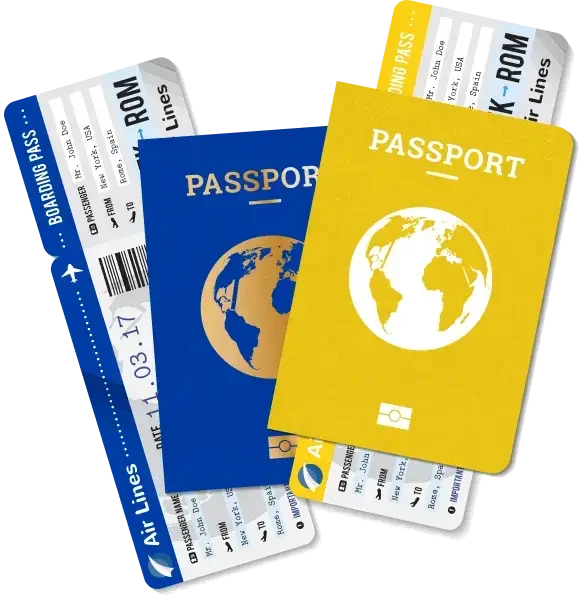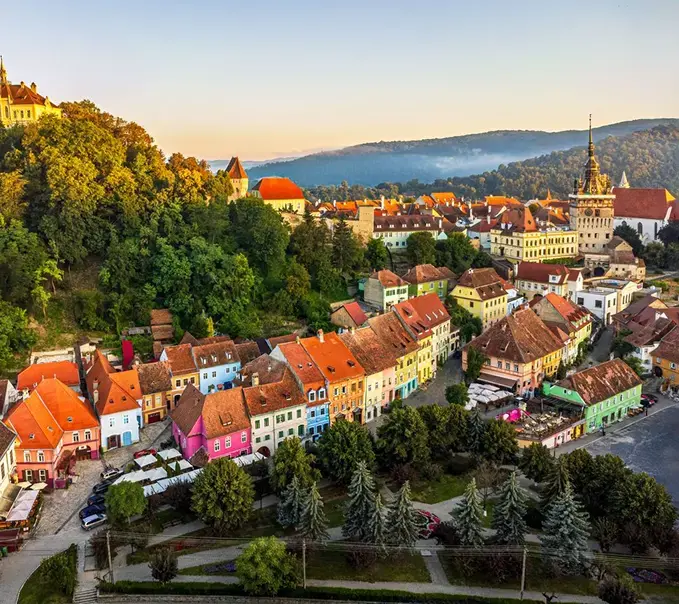Population
GDP (per capital)
Visa-Free Countries
GDP (purchasing power parity)
-
Immigrating to Romania Through Investment
-
Romania, now fully integrated into the Schengen Area as of 2025, offers investors a strategic gateway to the European market. Its EU membership, growing economy, and investor-friendly climate—especially in tech, energy, and manufacturing—make it an appealing choice for those seeking both business opportunities and residency within the EU.
- Main Industries
- Agriculture and Food Production
- Machinery and Equipment Manufacturing
- Electronics and Electrical Goods
- Textile and Apparel Industry
- Automotive Parts Manufacturing
- Information and Communication Technology
- Chemical and Pharmaceutical Industry
- Construction and Real Estate

UTC+1
238,397 km2
Bucharest
Romanian leu (RON)
Romanian (official)
Hungarian, German, Roma

-
Romania's Investment Immigration Landscape
-
In 2025, Romania presents a promising gateway for international investors. Its strategic position within the EU, combined with recent economic reforms, makes it a favourable environment for business and immigration.
-
Current Status
-
As of January 2025, Romania is fully integrated into the Schengen Area. With a GDP per capita exceeding €17,000 and consistent economic growth, it offers a stable and accessible EU-based economy for foreign investors.
-
Investment Climate
-
Foreign capital is flowing into high-growth sectors like information technology, automotive manufacturing, agriculture, and renewable energy. Cities such as Bucharest and Cluj-Napoca have become regional centers for innovation and entrepreneurship.
-
Government Initiatives
-
To attract and support foreign investment, Romania has introduced tax incentives, simplified business registration procedures, and residency pathways tied to job creation and capital input. EU-funded programs further boost access to grants and development funds.

-
Investment Options for Residency
-
Romania offers structured pathways for foreign investors seeking residency through business establishment or real estate acquisition. These avenues not only facilitate legal residence but also provide access to the European Union's expansive market.
Business Investment
Business Investment
Eligibility
Foreign nationals can obtain residency by establishing a Romanian company, either as a director or shareholder. Applicants must demonstrate a viable business plan and the capacity to contribute economically.
Investment Thresholds
- Limited Liability Company (LLC): Minimum investment of €50,000, with the creation of at least 10 full-time jobs.
- Joint-Stock Company (JSC): Minimum investment of €70,000, with the creation of at least 15 full-time jobs.
Process
The process involves registering the company with Romanian authorities, submitting a detailed business plan, and applying for a long-stay visa. Upon approval, a temporary residence permit is granted, renewable annually, contingent on meeting investment and employment commitments.
Real Estate Investment
Real Estate Investment
Overview
Investing in Romanian real estate can support residency applications, particularly when the property is utilized for business purposes or rental income.
Requirements
- Foreigners can freely purchase apartments.
- Non-EU citizens are restricted from directly purchasing land but may do so through a Romanian-registered company.
Benefits
Real estate investments offer potential for capital appreciation and rental income. Romania's real estate market has shown steady growth, with residential property prices increasing by an average of 1.3% per quarter.
-
Legal and Financial Considerations
-
Legal Framework
-
Romania's legal system is conducive to foreign investment, offering equal treatment to both domestic and international investors. The country adheres to EU regulations, including the screening of foreign direct investments to safeguard national interests. Investors are required to register their businesses with the Romanian Trade Register and obtain necessary approvals, especially when operating in sensitive sectors.
-
Financial Obligations
- Prospective investors should anticipate the following expenses:
- Visa and Residency Fees: A long-stay visa for economic activities costs €120, with additional fees for residence permit issuance.
- Investment Capital: Minimum investment thresholds vary based on the business structure and objectives. For instance, establishing a limited liability company requires a minimum capital of €50,000, while a joint-stock company necessitates at least €70,000.
- Operational Costs: These include expenses related to company registration, legal consultations, and compliance with local regulations.
-
Tax Implications
-
Romania maintains a flat corporate income tax rate of 16%. As of January 2025, the dividend tax rate has increased from 8% to 10% for both residents and non-residents. Additionally, Romania has established double taxation treaties with numerous countries, aiming to prevent the same income from being taxed in multiple jurisdictions.
-
Pathways to Citizenship
-
Residency Duration
-
Foreign nationals can apply for Romanian citizenship after legally residing in the country for at least eight years. This period is reduced to five years for those married to Romanian citizens. Notably, significant investors contributing over €1,000,000 to the Romanian economy may qualify for expedited naturalization, potentially halving the standard residency requirement.
-
Naturalization Process
-
Applicants must demonstrate good conduct, financial stability, and proficiency in the Romanian language and culture. The process involves submitting necessary documentation, including proof of residence and financial means, and passing an integration test. Recent reforms have digitized the application procedure, allowing for online submissions and tracking.
-
Dual Citizenship
-
Romania permits dual citizenship, enabling individuals to retain their original nationality upon naturalization. However, it's essential to verify whether one's home country allows dual citizenship to avoid unintended loss of original nationality.


-
Challenges and Considerations
-
Potential Obstacles
-
Investing in Romania offers numerous opportunities, but it's essential to be aware of potential challenges. The country's political landscape has experienced fluctuations, notably during the 2024–2025 election cycle, leading to market volatility and concerns over fiscal stability. Additionally, bureaucratic procedures can be intricate, with foreign direct investment reviews assessing potential impacts on national security and public order, sometimes lacking clear thresholds. Moreover, investors may encounter difficulties in sourcing skilled labor, as highlighted by a recent survey indicating talent shortages in key sectors.
-
Risk Management
-
To navigate these challenges, investors should adopt proactive strategies. Engaging local legal and financial experts can help in understanding and complying with regulatory requirements. Diversifying investments across sectors may mitigate market-specific risks. Staying informed about political developments and economic policies is crucial for timely decision-making. Additionally, participating in local business communities can provide valuable insights and support networks.
Conclusion
Romania presents a compelling pathway for investors seeking residency or citizenship within the European Union. With its growing economy, favorable investment climate, and strategic location, the country is increasingly becoming a destination of choice for global entrepreneurs. While challenges exist—such as regulatory complexity and market dynamics—well-informed investors equipped with local insight and professional guidance can navigate these effectively. As Romania continues to modernize and attract international capital, those who invest today may find themselves well-positioned for long-term success.
FAQ about Immigrating to Romania Through Investment (2025)
1. What types of investments qualify for residency in Romania?
Investors can obtain residency by establishing a business that meets minimum capital and job creation criteria or by investing in eligible real estate properties.
2. How long does it take to get permanent residency or citizenship through investment?
Permanent residency typically requires five years of continuous residence, while citizenship applications generally follow after eight years, with some fast-track options for significant investors.
3. Are there specific financial requirements for investment immigration?
Yes, business investments usually require a minimum capital starting around €50,000, plus fees for visas, permits, and legal processes. Real estate investments have separate thresholds depending on property type.
4. Can investors hold dual citizenship when naturalizing in Romania?
Romania permits dual citizenship, allowing investors to retain their original nationality, but it’s important to verify the policies of the investor’s home country.
5. What challenges should investors be aware of when immigrating through investment?
Potential obstacles include bureaucratic procedures, market volatility linked to political changes, and labor shortages. Engaging local experts and diversifying investments can help manage these risks.
Looking for expert visa support?
PROGRAM MATCH
Compare the different programs in a nutshell and discover their features
PROGRAM COST
Check the cost estimates for each offered program
PROGRAM MAP
Explore the power of global mobility for every passport in the world
